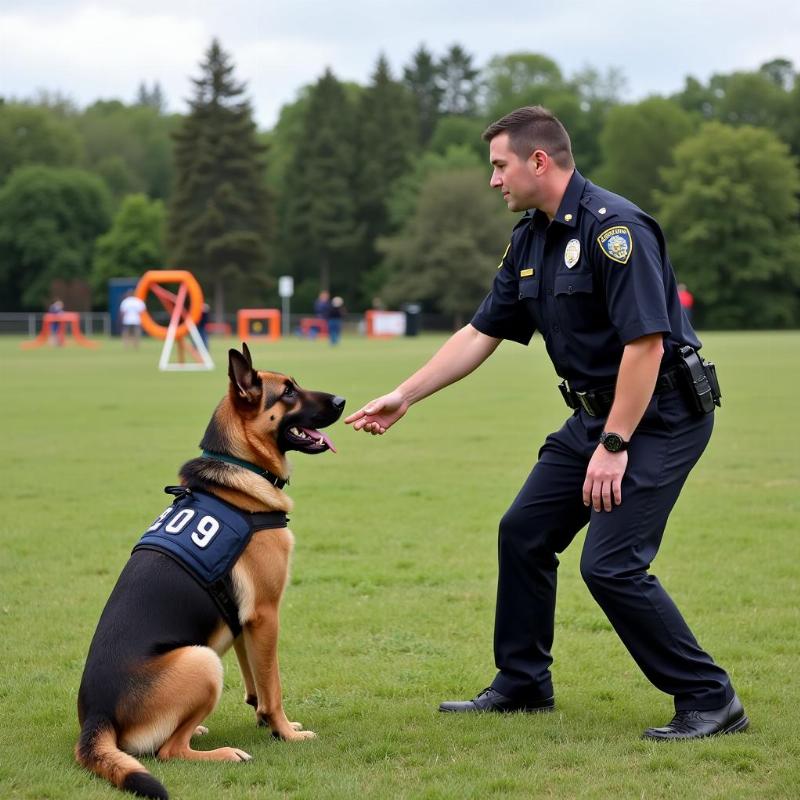Becoming a police dog trainer is a rewarding career path for those passionate about dogs and law enforcement. It requires dedication, patience, and a deep understanding of canine behavior. This guide will provide a comprehensive overview of the steps involved in becoming a police dog trainer in the US.
Understanding the Requirements
Aspiring police dog trainers should possess certain qualities and meet specific requirements. A strong love for dogs is essential, coupled with the ability to handle them firmly and fairly. Excellent communication and observation skills are crucial for understanding canine body language and effectively training them. Physical fitness is also important as the role can be demanding. Most agencies require a high school diploma or equivalent, and some prefer candidates with a college degree in animal science or a related field.  Guide to Becoming a Police Dog Trainer
Guide to Becoming a Police Dog Trainer
Educational Pathways
Several educational pathways can prepare individuals for a career in police dog training. Formal dog training certifications from reputable organizations are highly beneficial. These certifications demonstrate a commitment to professional development and provide a foundation in canine behavior and training techniques. Some community colleges and vocational schools also offer specialized programs in animal handling and training. Gaining experience through volunteering or working at animal shelters or veterinary clinics can also be valuable. how to become a dog trainer in florida
The Training Process
The training process for police dogs and their handlers is rigorous and demanding. It involves a combination of obedience, agility, and specialized skills training. Obedience training forms the foundation, teaching dogs essential commands like sit, stay, and come. Agility training focuses on developing the dog’s physical abilities and coordination, preparing them for tasks like navigating obstacle courses and apprehending suspects. Specialized skills training varies depending on the dog’s intended role, such as narcotics detection, explosives detection, or search and rescue.
Building the Bond
The relationship between a police dog and its handler is paramount to their success as a team. This bond is built through consistent interaction, training, and trust-building exercises. Handlers spend countless hours with their canine partners, developing a deep understanding of their individual personalities and behaviors. This close relationship allows them to communicate effectively and work together seamlessly in high-pressure situations.
Working as a Police Dog Trainer
Once trained, police dog trainers typically work within law enforcement agencies. Their responsibilities include selecting and training suitable dogs, conducting ongoing training and assessments, and ensuring the well-being of the canine officers. They also work closely with handlers, providing guidance and support. The work can be challenging and demanding, but it offers immense satisfaction for those dedicated to serving their communities alongside their canine partners. how to become a police dog trainer
Career Advancement
Experienced police dog trainers may have opportunities for career advancement. They can specialize in particular areas of training, such as scent detection or tactical operations. Some trainers also move into supervisory or management roles within their agencies, overseeing training programs and personnel. Continuing education and professional development are essential for staying up-to-date with the latest training techniques and best practices.
Conclusion
Becoming a police dog trainer requires dedication, passion, and a deep understanding of canine behavior. The process involves rigorous training, building a strong bond with the dog, and continuous professional development. While the path may be challenging, the rewards of working alongside these remarkable animals in service to the community are immeasurable. dog killer next door sign
FAQ
-
How long does it take to become a police dog trainer? The training process can vary, but it typically takes several months to a year to become a certified police dog trainer.
-
What breeds are commonly used as police dogs? German Shepherds, Belgian Malinois, and Dutch Shepherds are among the most common breeds used as police dogs due to their intelligence, athleticism, and trainability.
-
Is prior law enforcement experience required? While some agencies prefer candidates with law enforcement experience, it is not always a requirement.
-
What are the physical demands of being a police dog trainer? The role can be physically demanding, requiring handlers to be in good shape and able to handle large, powerful dogs.
-
What is the average salary of a police dog trainer? Salaries vary depending on location and experience, but the average salary for a police dog trainer in the US is competitive. how to train a police dog
-
What are the ongoing training requirements for police dogs and their handlers? Police dogs and their handlers typically undergo regular training and assessments to maintain their skills and proficiency.
-
What are the risks associated with being a police dog trainer? Working with police dogs can involve some inherent risks, including the potential for dog bites or injuries during training or operational deployments. how many police dogs die a year
Beautdogs.us is your premier online destination for comprehensive dog care information, breed guides, and access to top-quality products and services tailored for the American dog owner. Whether you’re a seasoned dog lover or a new pet parent, Beautdogs.us provides expert advice, practical tips, and valuable resources to enhance your dog’s health, well-being, and overall happiness. Contact us today to learn more about how we can help you and your furry friend! Email: [email protected], Phone: +1 501-555-7529 or visit us at Beautdogs.us.